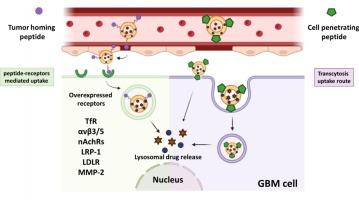Recent advances in liposomes and peptide-based therapeutics for glioblastoma treatment
IF 11.5
1区 医学
Q1 CHEMISTRY, MULTIDISCIPLINARY
引用次数: 0
Abstract
In the context of glioblastoma treatment, the penetration of drugs is drastically limited by the blood-brain-barrier (BBB). Emerging therapies have focused on the field of therapeutic peptides for their excellent BBB targeting properties that promote a deep tumor penetration. Peptide-based strategies are also renowned for their abilities of driving cargo such as liposomal system allowing an active targeting of receptors overexpressed on GBM cells. This review provides a detailed description of the internalization mechanisms of specific GBM homing and penetrating peptides as well as the latest in vitro/in vivo studies of liposomes functionalized with them. The purpose of this review is to summarize a selection of promising pre-clinical results that demonstrate the advantages of this nanosystem, including an increase of tumor cell targeting, triggering drug accumulation and thus a strong antitumor effect. Aware of the early stage of these studies, many challenges need to be overcome to promote peptide-directed liposome at clinical level. In particular, the lack of suitable production, the difficulty to characterize the nanosystem and therapeutic competition leaded by antibodies.

治疗胶质母细胞瘤的脂质体和多肽疗法的最新进展。
在治疗胶质母细胞瘤方面,药物的渗透受到血脑屏障(BBB)的极大限制。新出现的疗法主要集中在治疗肽领域,因为它们具有良好的 BBB 靶向特性,能促进药物深入肿瘤。基于肽的治疗策略还因其驱动货物的能力而闻名,如脂质体系统可主动靶向肿瘤细胞上过度表达的受体。本综述详细介绍了特定 GBM 归巢肽和穿透肽的内化机制,以及使用这些肽功能化脂质体的最新体外/体内研究。本综述旨在总结一些有前景的临床前研究结果,这些结果证明了这种纳米系统的优势,包括增加肿瘤细胞靶向性、引发药物蓄积,从而产生强大的抗肿瘤效果。由于这些研究还处于早期阶段,要在临床上推广肽导向脂质体还需要克服许多挑战。特别是缺乏合适的生产、纳米系统难以表征以及抗体导致的治疗竞争。
本文章由计算机程序翻译,如有差异,请以英文原文为准。
求助全文
约1分钟内获得全文
求助全文
来源期刊

Journal of Controlled Release
医学-化学综合
CiteScore
18.50
自引率
5.60%
发文量
700
审稿时长
39 days
期刊介绍:
The Journal of Controlled Release (JCR) proudly serves as the Official Journal of the Controlled Release Society and the Japan Society of Drug Delivery System.
Dedicated to the broad field of delivery science and technology, JCR publishes high-quality research articles covering drug delivery systems and all facets of formulations. This includes the physicochemical and biological properties of drugs, design and characterization of dosage forms, release mechanisms, in vivo testing, and formulation research and development across pharmaceutical, diagnostic, agricultural, environmental, cosmetic, and food industries.
Priority is given to manuscripts that contribute to the fundamental understanding of principles or demonstrate the advantages of novel technologies in terms of safety and efficacy over current clinical standards. JCR strives to be a leading platform for advancements in delivery science and technology.
 求助内容:
求助内容: 应助结果提醒方式:
应助结果提醒方式:


